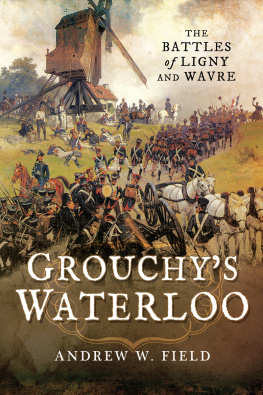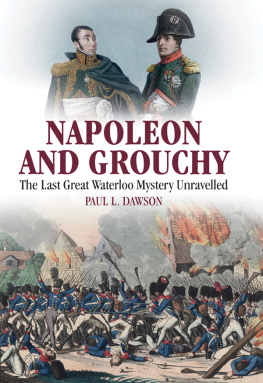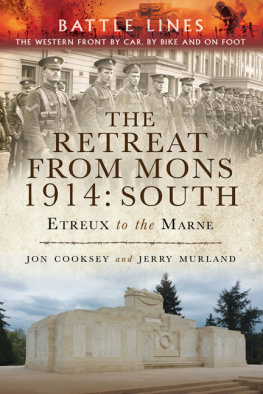| Note: | Images of the original pages are available through Internet Archive. See https://archive.org/details/battleofwavregr00kell |
THE BATTLE OF WAVRE AND
GROUCHYS RETREAT
THE BATTLE OF WAVRE
AND GROUCHYS RETREAT
A STUDY OF AN OBSCURE PART OF
THE WATERLOO CAMPAIGN
By W. HYDE KELLY, R.E.
WITH MAPS AND PLANS
LONDON
JOHN MURRAY, ALBEMARLE STREET, W.
1905
AUTHORS PREFACE
So much has been written on the Waterloo Campaign that, even in the smallest details, nothing new can be revealed; but the dazzling magnitude of the great battle itself has obscured a part of the campaign which is seldom studiedthe battle against Thielemann, and Grouchys skilful retreat from Wavre.
I have chosen this tail-end of the campaign because little is known about it; because it serves useful lessons even for to-day; because the operations leading up to the battle round Wavre are of great interest; and because a campaign full of mistakes should be studied as carefully as a campaign free from error. From history we obtain experience, and experience teaches us how to act for the future. We learn how great men of old time fought their battles and managed their retreats; we see the reasons of their successes and their failures; and we should endeavour to make use of our lessons when our own time comes. Not that Grouchy can be deemed a great soldier; nor can his part of the 1815 campaign be regarded as of prime importance in itself; but as showing the small trifles that mar great plans in their execution, as showing how little a thing will sometimes destroy the grandest conceptions, his operations from 16th June to the end of the month are well worthy of attention.
I might have employed my time more profitably had I chosen to work upon some more illustrious name than Grouchys, or upon some more modern campaign of greater advantage to the war student of to-day; but I chose to bring forward an obscure page in the history of the most famous campaign, for in that history there is much that may still be laid to heart.
Great deeds deserve great critics, but, as Colonel Henderson wrote in his Preface to Stonewall Jackson, if we were to wait for those who are really qualified to deal with the achievements of famous captains, we should, as a rule, remain in ignorance of the lessons of their lives, for men of the requisite capacity are few in a generation. Man is not so fortunate that he can live in every period; and for knowledge he must go backwards to search in history. The statesman will read of the great quarrels between Charles I. and his Parliament, not because he would imitate either the one side or the other, but because he will desire to mould future action upon the experience of the past. Napoleon himself prepared all his ambitious schemes from the pages of Tacitus, Plutarch and Livy, and the histories of the deeds of Hannibal, Alexander, and Csar. Wellington made it a rule to study for some hours every day; and since these two great men advocate study of history, who is there who shall gainsay the advantages of learning? But the true method of reading history requires something far deeper than mere perusal: it must be accompanied by careful and continuous thought. A true history will encourage the reader to bury himself in the very atmosphere of the time, and will bring him to see with his eyes the comings and goings of great men, the rights and wrongs of their deeds, and their impress upon contemporary people.
This small volume attempts nothing of this kind: it is a sketch, a mere outline, of a minor portion of a remarkable campaign. In it I have made no mention of the tactical formations employed; I have given no details of armaments, equipments, or means of transport; for these are now of no value to the soldier-student. The comments or remarks are to be taken or left, as it shall please the reader: they are my own views; possibly they may coincide with the views of others; in that case they will be interesting.
I may admit that these pages were at first written for my own usemere notes taken down while I read a dozen authorities on the subject. I afterwards persuaded myself that my studies might prove of use to those who had little time to search the volumes in the libraries.
I trust I shall not offend German susceptibilities by omitting the prefix von in the Prussian names and titles. I only do so to save space.
I have to add my gratitude to the numerous writers and historians who have told the splendid story of Waterloo, and from whom I have drawn my facts.
W. HYDE KELLY.
August 1905.
CONTENTS
| CHAP. | PAGE |
| I. | 1 |
| II. | 52 |
| III. | 66 |
| IV. | 80 |
| V. | 100 |
| VI. | 108 |
| VII. | 115 |
| VIII. | 133 |
| IX. | 153 |
| 165 |
MAPS
MAP ILLUSTRATING THE OPERATIONS OF JUNE 15TH TO 20TH 1815.
William Stanford & Company, Ltd., The Oxford Geographical Institute.
John Murray, Albemarle St., W.
THE BATTLE OF WAVRE AND GROUCHYS RETREAT
CHAPTER I
BRIEF DISCUSSION OF THE EARLIER OPERATIONSUP TO LIGNY
The Allied troops in the Netherlands had begun to concentrate as early as the 15th of March. They were cantoned from Trves and Coblentz to Courtrai. But their commanders were away in Viennaboth Wellington and Blucher. The largest number that could be concentrated to meet a sudden attack on Belgium in April was 80,000 men. Of these, 23,000 were Anglo-Hanoverian troops, 30,000 were Prussians, 14,000 were Saxons, and the remainder Dutch-Belgians. The spirit of discipline was almost wholly wanting among the Saxons and Dutch-Belgians; the greater part of them had, at one time or another, served Napoleon, and were not to be trusted. Kleist, commanding the Prussians on the Rhine, had arranged with the Prince of Orange, who commanded the troops in the Netherlands, that, in the event of a French attack, they would retire together on Tirlemont; thus leaving Brussels exposed, and giving the enemy a firm footing in Belgium.
By the 1st of April, Napoleon could have mustered a force of 50,000 men on the frontier near Charleroi. He could have marched direct on Brussels (as the Prince of Orange and Kleist had agreed to fall back). With Brussels in his hands, he could have turned and repeated his favourite strategy by falling upon the allied armies in turn. Wellington was dreading such an attack.
But the project, although it may have entered Napoleons thoughts, was never seriously contemplated by him. His army, although rapidly being raised, organised, and equipped in hundreds of thousands of men, was not yet in a condition to enter upon a prolonged campaign. He might gain a slight temporary success with these 50,000 men; he might be reinforced by another 100,000 in the North; but, meantime, how should he check the other great invading armies of the Allies? For their preparations were forging ahead. Barclay de Tolly was marching with 167,000 Russians in three columns through Germany. Marshal Schwarzenberg, commanding an Austrian army of 50,000 men, and the Archduke Ferdinand, at the head of 40,000 men, were hastening to reach the Rhine. One hundred and twenty thousand men were being collected in Lombardy, after Murats decisive overthrow. Prince Wrede, commanding a Bavarian army 80,000 strong, was assembling his forces behind the Upper Rhine. Truly a formidable array!












